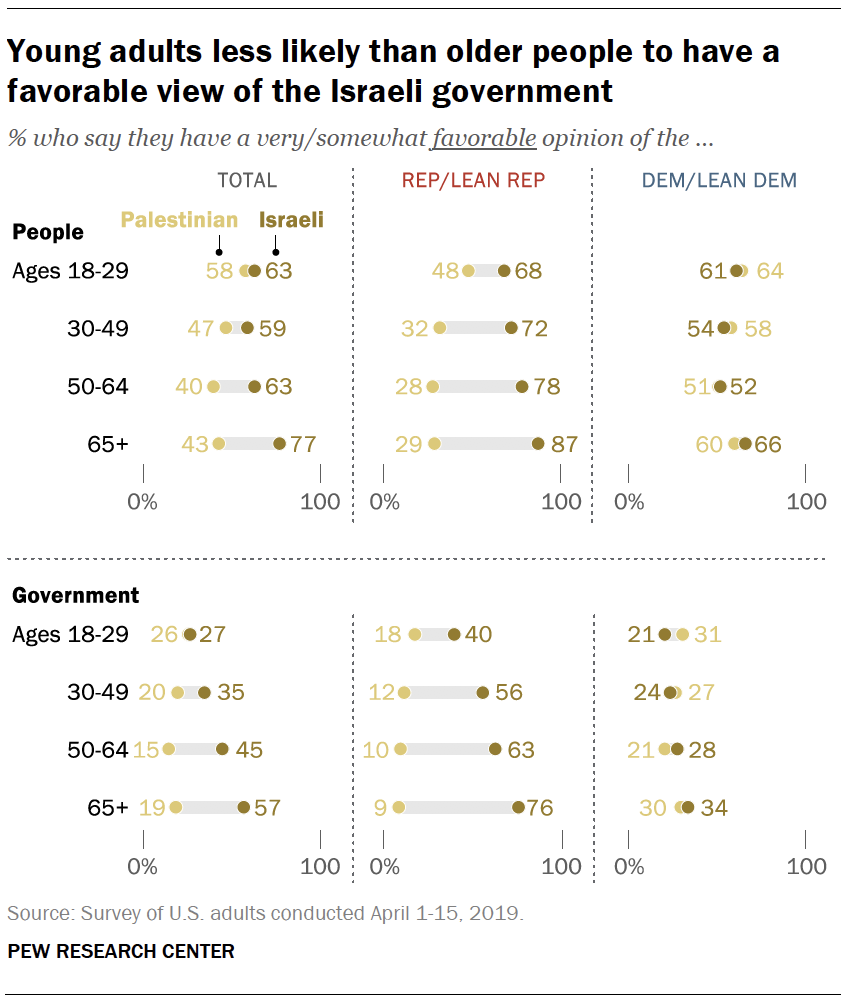[Updated May 6 with Pew’s new analysis of US Jews]
When it comes to the longstanding Israeli-Palestinian conflict, do American evangelicals favor one side or the other?
A new study from the Pew Research Center finds one-third actually feel favorable toward both—when it comes to their peoples. And one-third feel unfavorable toward both governments.
But of the US government, and President Donald Trump’s Israel policies in particular, American evangelicals far outpace American Jews in support. A majority (62%) of evangelicals in the US believe Trump is striking “the right balance” between Israelis and Palestinians, while less than half (47%) of Jews in the US agree.
Politico Magazine recently profiled Telos, an evangelical group dedicated to changing the narrative on Israel. “Christian faith communities persistently advocate for one-sided postures towards the conflict,” states the group, whose name means purpose in Greek, on its website. “Our telos is the freedom, security, and dignity of every human being in the Holy Land.”
But the profile prompted a strong critique from Mark Tooley of the Institute on Religion and Democracy (IRD), who describes such “ambivalence” as actually harming both Israelis and Palestinians. Without solid evangelical support buttressing the US alliance with Israel, all sides will only entrench and deepen the conflict, he argues—making negotiation less likely.
“Impartiality and avoiding polemical stances are now de rigeur in much of nouveau Evangelicalism, so the Telos appeal has resonance,” he wrote on IRD’s blog. “Aren’t Christians supposed to be on everybody’s side?”
Pew’s new survey of 10,523 US adults aimed to measure exactly that.
For decades, Pew has asked which side Americans sympathized with more: Israel or the Palestinians? But this year, researchers recognized a problem: this approach compared a country with a people.
It was not apples-to-apples; nor did it allow for respondents to signal sympathy for both. So this year, researchers instead used separate questions asking about a favorable or unfavorable opinion toward the Israelis and the Palestinians as peoples, as well as toward their respective governments.
While the report focused on Republicans and Democrats, Pew broke out for CT the views of four Christian groups, as well as the religiously unaffiliated or “nones.” Respondents were categorized by the type of church they attend, instead of the common approach of self-identification.
About 1 in 3 evangelical church attendees (34%) reported favorable opinions of both peoples.
However, the weight is still on the Israeli side: 43 percent said they felt favorable toward Israelis but unfavorable toward Palestinians; 12 percent even said they felt unfavorable toward both.
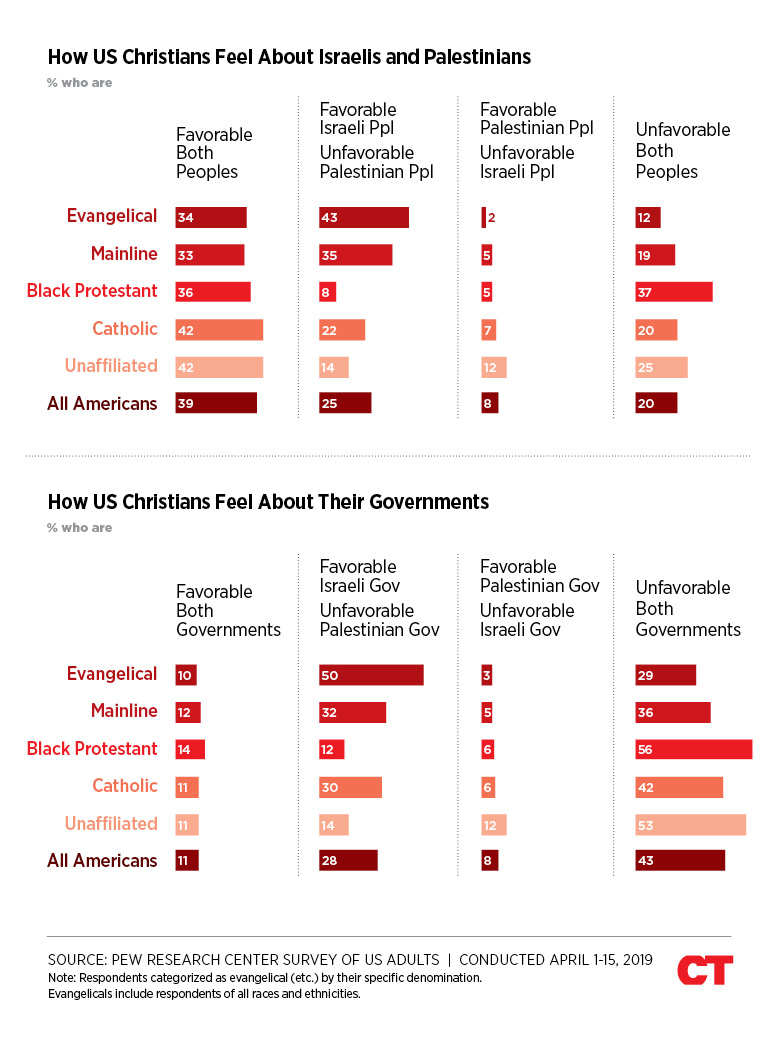
The share of mutual favor does not hold for the respective governments.
Only 10 percent of evangelical church attendees said they felt favorable toward both, with 50 percent favorable toward the Israeli government and unfavorable toward the Palestinian government. Another 29 percent feel unfavorable toward both.
Overall, evangelical church attendees registered 79 percent favorable toward the Israeli people and 61 percent favorable toward their government, while only 35 percent favorable toward the Palestinian people and 13 percent favorable toward their government.
The overall share for all Americans was 64 percent favorable toward the Israeli people and 41 percent favorable toward their government, while 46 percent favorable toward the Palestinian people and 19 percent favorable toward their government. Among all Americans, 39 percent feel favorable toward both peoples, slightly higher than the evangelical average.
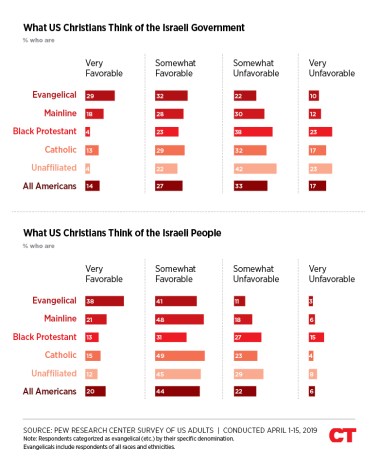
Other Christian groups showed more variance.
Those attending mainline churches reported 69 percent favor for the Israeli people and 46 percent favor for their government, while 38 percent favorable toward the Palestinians and 17 percent favorable toward their government.
A third feel favorable toward both peoples (33%), and another third feel favorable toward Israelis and unfavorable toward Palestinians (35%).
Those attending Catholic churches reported 64 percent favor for the Israeli people and 42 percent favor for their government, while 48 percent favorable toward the Palestinians and 18 percent favorable toward their government.
Among Catholic attendees, 42 percent were favorable toward both peoples, while 22 percent were favorable toward Israelis and unfavorable toward Palestinians.
The results began to shift among Americans attending historically black Protestant churches and among the religiously unaffiliated or “nones”—particularly toward the Israeli government.

Those attending historically black Protestant churches reported 44 percent favor for the Israeli people and 27 percent favor for their government. They were 41 percent favorable toward the Palestinians while 20 percent favorable toward their government.
Among black church attendees, 36 percent were favorable toward both peoples, with only 8 percent favorable toward Israelis and unfavorable toward Palestinians; 37 percent were unfavorable toward both.
The religiously unaffiliated reported 57 percent favor for the Israeli people and 26 percent favor for their government. They were 54 percent favorable toward the Palestinians while 24 percent favorable toward their government.
Among the nones, 42 percent were favorable toward both, with only 14 percent favorable toward Israelis and unfavorable toward Palestinians; 25 percent were unfavorable toward both.
Among Americans that favor the GOP, Pew found that evangelical Republicans are more likely than non-evangelical Republicans to feel favorable toward Israel’s government (73% vs. 55%).
“The survey confirms evangelicals are the most pro-Israel demographic in the USA, so no major surprise,” Tooley told CT. “Of course most are reluctant to say anything negative towards a people. And some people might be negative toward Israel’s current government though still largely friendly to Israel.
“The poll indicates the greatest challenges for pro-Israel [advocates] in the USA are black Protestants and the non-religious,” he continued. “Black Pentecostals tend to be more Zionist, so I'm curious what percentage they were. Hispanic evangelicals also tend to be pro-Israel, so I’m sorry there are no numbers for them.” [Pew’s survey was unable to break out the responses of Hispanic Christians.]
“This idea that if you are for one you have to be against the other may make people feel good, but it can actually help perpetuate the conflict and harm the very people you claim to care about,” Deatherage told CT. “We need to remember that there’s no good future for Israelis without a good future for Palestinians, and there’s no good future for Palestinians without a good future for Israelis. It’s naïve to think there’s any other way to resolve this conflict.
“And it seems apparent from these latest poll numbers that a good number of Americans, including evangelicals, realize both Israelis and Palestinians are all made in the image of God and deserve to live in security with dignity and freedom,” he said.
Pew also asked about President Trump’s approach toward Middle East peace. His senior advisor Jared Kushner recently stated the long-awaited “Deal of the Century” would be released following the end of Ramadan in early June.
CT recently surveyed prominent evangelical leaders about their “red lines” in Israeli-Palestinian peace. Anecdotally, they mirrored the percentages reported by Pew.
Of Americans attending evangelical churches, 72 percent thought Trump was striking the right balance, while 15 percent thought he was “favoring the Israelis too much” and 4 percent thought he was “favoring the Palestinians too much.”
Overall, 50 percent of Americans believe Trump is striking the right balance, while 34 percent and 6 percent believe he is favoring Israelis or Palestinians too much, respectively.
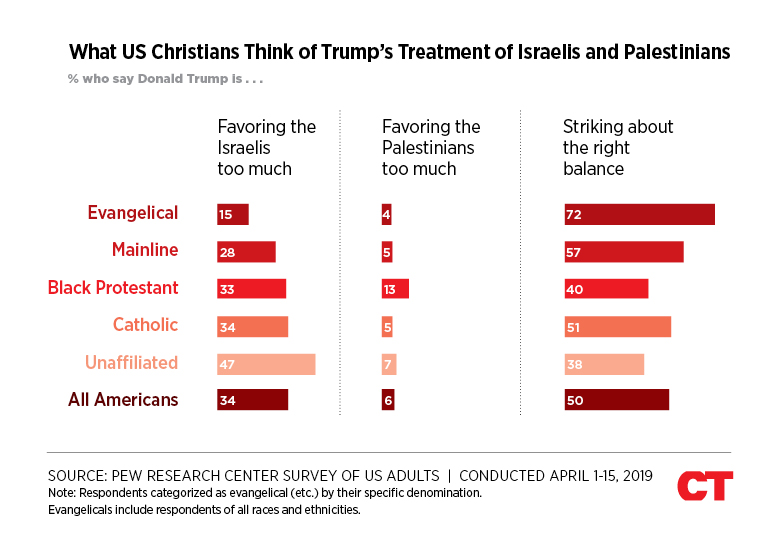
Mainline and Catholic church attendees were closer to the US average: 57 percent of mainliners and 51 percent of Catholics thought Trump is striking the right balance, while 28 percent of mainliners and 34 percent of Catholics thought he is favoring the Israelis too much. Only 5 percent of each believe he is favoring the Palestinians too much.
But attendees at historically black Protestant churches, as well as nones, skewed against Trump: 40 percent of black church attendees and 38 percent of the unaffiliated believe Trump is striking the right balance, while 33 percent of black church attendees and 47 percent of the unaffiliated believe he is favoring the Israelis too much. Only 13 percent and 7 percent, respectively, believe he is favoring the Palestinians too much.
In addition to US evangelicals favoring Trump’s Israel policy more than US Jews by 15 percentage points in Pew’s followup analysis [May 6], a 2016 Pew survey also found striking opposites between US evangelicals and Israeli Christians: 8 in 10 (82%) white evangelicals believed God gave the land of Israel to the Jews, while only 19 percent of Christians actually born, raised, and living in Israel agreed. (This number includes Messianic Jews and Protestants, but reflects primarily the majority opinion of Arab Christians, both Catholic and Orthodox.)
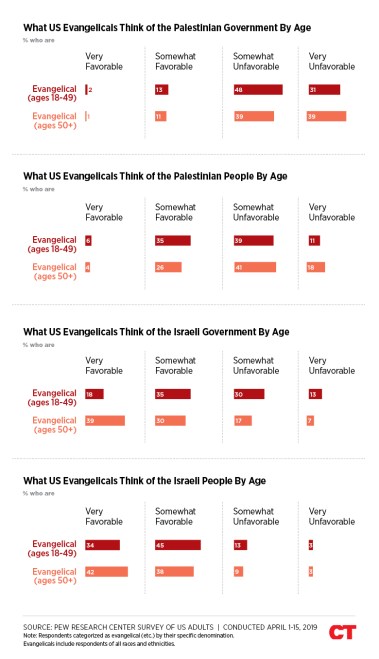
Pew also reported a generational gap: 77 percent of Americans ages 55 and older have favorable opinions toward the Israeli people. This percentage dropped to 63 percent for those between ages 18 to 29.
And while 43 percent of older Americans have favorable views toward the Palestinian people, this percentage climbed to 58 percent in the younger generation.
The gap was even more pronounced toward the Israeli government: 57 percent of those ages 55 and older were favorable. Only 27 percent of those ages 18 to 29 were like-minded.
Pew could not break down religious affiliation according to these age ranges, but previous CT reporting noted how a LifeWay Research survey showed significant evangelical shifts on Israel.
Four in 10 younger evangelicals (41%), defined by LifeWay as ages 18 to 34, had no strong views about Israel. Fewer younger evangelicals (58%) had an overall positive perception of Israel than older evangelicals (76%), defined as ages 65 and older.
And two-thirds of younger evangelicals said Christians need to do more to care for Palestinians. That drops to 54 percent among older evangelicals.
What do these trends necessitate?
“Serious statecraft domestically and globally requires decisive choices,” wrote Tooley. “It also often entails taking sides.”
Many American evangelicals still do, according to Pew. But one-third sympathize with Israelis and Palestinians together.
“As Americans come to care deeply about people on both sides of the Green Line,” wrote Telos, “we inspire and equip them … radically improving the way the United States relates to that part of the world.”
Here are Pew’s findings for all Americans:
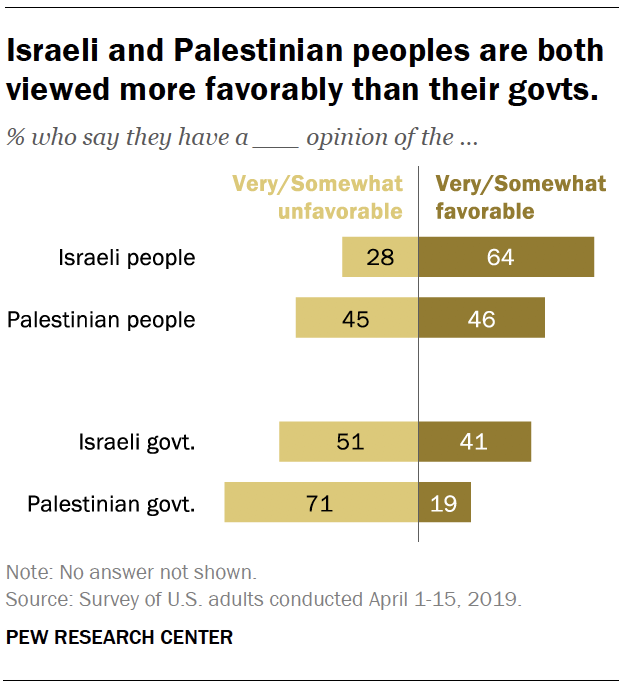
.

.

.
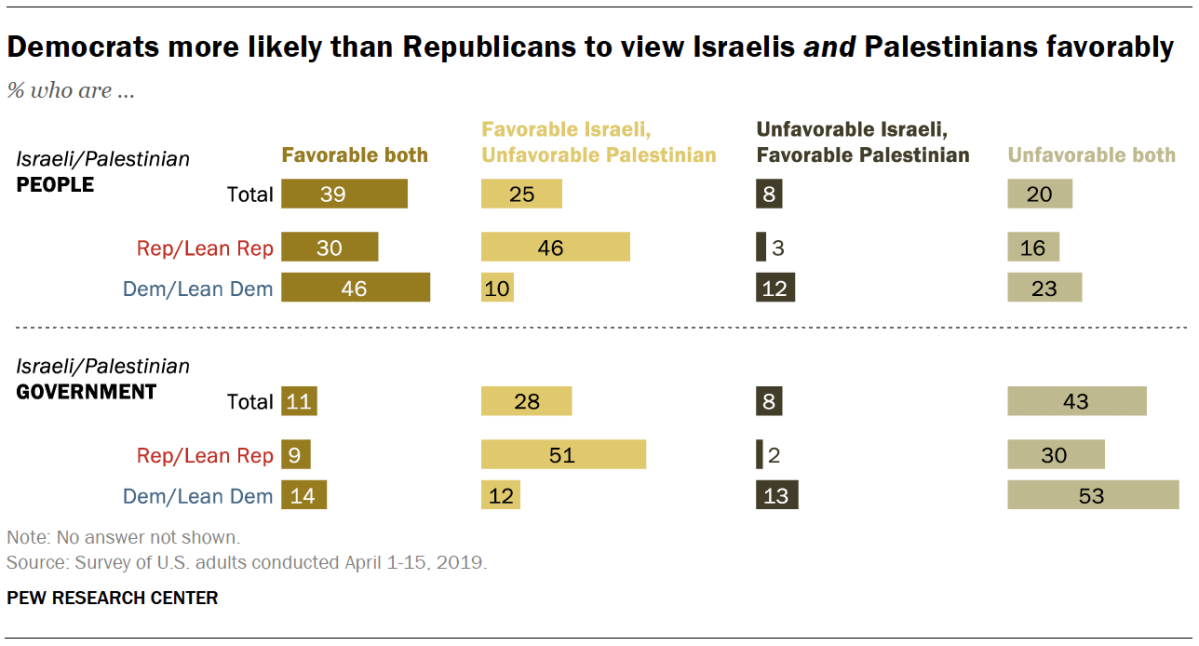
.
